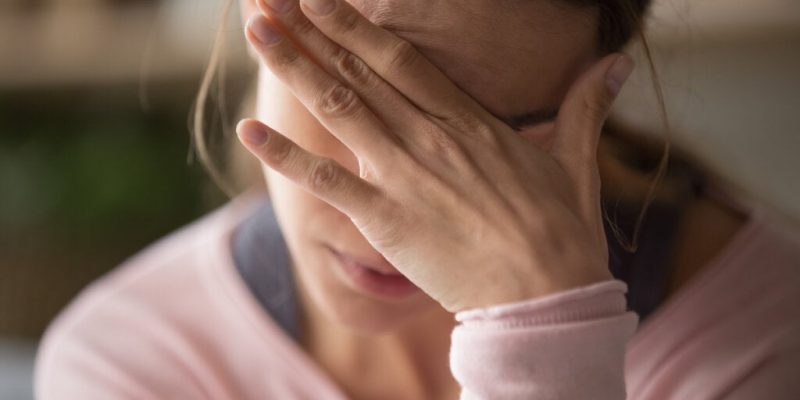We all make some mistakes in our lives, in fact, we make many of them. Inevitably, they often generate feelings of guilt, discomfort, or frustration. However, why do you feel bad when you make a mistake?
Self-demand, search for perfection, and intransigence. These are some of the reasons behind this situation. We reflect on this and talk about why it’s sometimes difficult for you to admit your mistakes.
The reasons why you feel bad when you make mistakes
What does it mean to feel ‘bad’? It can be many things. When you make a mistake, you might feel guilty, sad, or frustrated.
Depending on your narrative of the error (how you interpret it) and your personality, you may feel different emotions. We’re going to talk about why you feel bad when you make a mistake.
1. Pride and ego
Pride and ego are two concepts that explain, in part, why you feel bad when you make mistakes.
One definition of pride is “the belief that you are better or more important than other people”. Also “a feeling of pleasure and satisfaction that you get because you or people connected to you have done or got something good”.
Pride and ego are first cousins, and go hand in hand. In the case of the ego, we’re speaking of the psychic instance that allows us to recognize ourselves as independent individuals with our own identities. However, in colloquial language, the ego refers to the excessive evaluations that we make of ourselves. In effect, to think only of ourselves.
If you have an inflated ego, it’s more likely that it’ll be difficult for you to recognize your mistakes or that you feel intense discomfort when you make them and subsequently recognize them.
If we add pride to this ego, your discomfort will double. In fact, the more proud you are:
- The harder it is to admit your mistakes.
- The worse you feel when committing them.
2. Self-esteem, control, and power
Closely related to the ego are three interesting concepts: self-esteem, control, and power. For example, you may feel bad after making mistakes because acknowledging that you were wrong could hurt your self-esteem. Since you want to protect it, you can’t avoid the temptation of not admitting your mistakes.
In line with this, a study (2012) published in the European Journal of Social Psychology affirmed that people who make mistakes and don’t apologize afterward, possess more self-esteem and believe they have more control and power, as compared to those who own up to their mistakes and apologize.
According to Tyler Okimoto, one of the study’s authors, “In a way, apologies give those who receive them a sense of power”. He gives an example. If you apologize to your partner for something you’ve done wrong, your apology allows your partner to choose between lessening your pain by forgiving you or intensifying it by withholding their forgiveness. Hence, they have power. In addition, people who choose not to apologize for their mistakes feel that they’re the ones with power and control. This leads them to avoid apologizing.
3. Self-demand and rigidity
Highly self-demanding people feel really bad when they make mistakes. That’s because they feel they’re ‘failing’ themselves. These people may perceive the error differently than those who aren’t so demanding of themselves.
As they’re constantly looking for perfection (which is actually unattainable), anything that doesn’t reach this standard they understand as a mistake, and mistakes lead them to feel frustrated with themselves.
The emotions that these people most commonly feel when they make mistakes are frustration and anger. They’re hard and rigid kinds of people. This often translates into intransigent internal dialogues based on self-reproach.
4. Feelings of guilt
When you make a mistake, you also feel guilty because you’ve done something ‘different’ than what you supposedly ‘should’ve done’. On an emotional level, guilt is seen as an emotion that you feel when you do (or have done) something that’s not right, or when you harm a third party.
In a way, there are people who feel guilty because, unconsciously, guilt is a way of ‘compensating’ for the damage caused. By feeling guilty, you ‘punish yourself’ and ‘pay the price’ for having made a mistake or having hurt someone.
Logically, this is all done unconsciously. Furthermore, in reality, guilt is a really useless feeling, because it doesn’t lead you to take action, but often to victimhood. For this reason, it’s important to begin to change (passive) guilt for (active) responsibility because, through the second, the dialogue with yourself will be friendlier and constructive, unlike in the case of guilt, which leads to self-pity and self-blame.
Is it hard for you to admit your mistakes?
You may feel bad when you make mistakes, but do you recognize the fact? Or, is it difficult for you to do so? This is another interesting question that allows you to reflect and ask yourself whether the fact that it’s difficult for you to recognize them, leads you to more or less discomfort.
On the one hand, if you don’t recognize them, you might harbor a feeling of guilt that you end up repressing, and that hurts you. On the other hand, recognizing them means you’ll eventually forget them and won’t experience any discomfort.
Whether or not you recognize your mistakes depends on you, as an individual. It also depends on factors such as pride, ego, and the ability to appreciate that you’ve really made a mistake, or your fear of disappointing others, etc.
However, in addition, there are two other key elements that influence your decision to recognize your mistakes or not: the so-called confirmation bias and the ability you have (or not) to change your behavior.
1. Confirmation bias
Confirmation bias (Plous, 1993, cited in a review by Scott, 1994) is the tendency that people have to favor, seek, interpret, and remember information that confirms their own beliefs or hypotheses. On the other hand, everything that goes against those beliefs and hypotheses they consider in a lesser way.
This bias could make it difficult for you to recognize your mistakes. That’s because, if you always look for ideas that support what you think, it’s difficult for you to recognize that sometimes you’re wrong. This is because you’re not looking for information that supports your mistakes, but your beliefs.
2. The ability to change behavior
A study (2014) conducted by researchers at Stanford University (USA) claimed that people are more likely to accept their mistakes when they believe they’re capable of changing their behavior. If not, it’s much more difficult for them to do so.

We’re only human and all make mistakes
Feeling bad about being wrong is human. It happens to all of us. Don’t feel bad about it. However, it may be interesting to ask yourself what lies behind your emotions, if your mistake could’ve been avoided, and how you should act next time.
Knowing the reasons that led you to act like this, and also those that led you to feel bad afterward forms part of the process of self-knowledge and personal growth, a journey that, in reality, lasts a lifetime.
“I’ve learned that often mistakes can be as good a learning experience as success.”
-Jack Welch-
The post Why You Feel Bad When You Make Mistakes appeared first on Exploring your mind.



















Comments